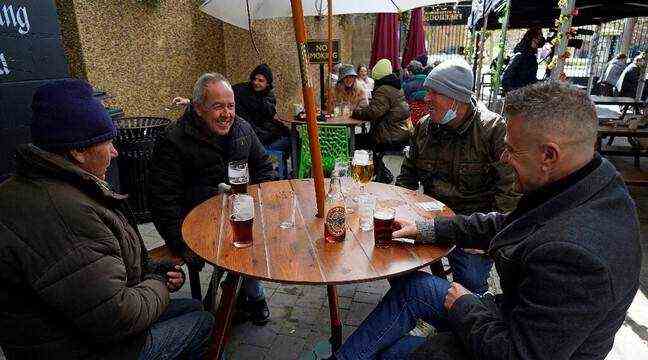A pub opened in the UK on Monday, with its first customers already – Niklas HALLE’N / AFP
- This Monday, the British see the reopening of terraces, non-essential stores and hairdressers.
- A deconfinement ahead of ours, which could give France the desire to observe what is happening across the Channel to learn lessons.
- But the comparison between nations, if it has its virtues, quickly presents some limits.
This Monday, the United Kingdom continues its deconfinement and notably reopens its terraces. Another blow for us frog eaters who are waiting on the other side of the Channel for the possible but still very uncertain lifting of restrictions. But what if instead of jealous of the British, we use the UK as a sort of deconfinement laboratory to make our own?
In France, the first measures will be lifted at best at the beginning of May, and the terraces of bars and restaurants could reopen at the earliest around May 15. Which leaves us three and five weeks respectively to go to the UK and learn from their mistakes and see what works.
Observe but not mimic
The United Kingdom is not the first country to accelerate its deconfinement. If we can exclude comparisons with Israel – too advanced in vaccination to serve as an example for France – Paris could on the other hand also draw inspiration from Portugal or Greece, which have also initiated the process of reopening.
“The virus still contains so much unknown and remains so unpredictable that each country tries to see what the others are doing each time to be inspired by what is being done or not done”, raises Pascale Joannin, general manager of the Robert Schuman Foundation, a European think tank. However, observation has its limits and rarely leads to mimicry, each state reacting according to its own criteria and leaders. The expert takes as an example the differences in the management of the first wave, between a Sweden without confinement, a very flexible confinement for the Germans, strict for the Spaniards and the Italians and strict with a certificate as a bonus for the French (little lucky ones that we are).
The temptation of “health sovereignty”
Such divergences can be explained by a clear and assumed desire to find its own path and its national solutions. Anne Sénéquier, doctor and co-director of the World Health Observatory, thus notes the temptation for each country to have its “health sovereignty” and to claim not to do like everyone else: “This could have led to decisions very questionable in terms of health, such as the maintenance of schools in France, the non-confinement in Sweden or the opening of restaurants in Spain. Each country defending its exception to justify itself. “
A trend that tends to regress from the start of the crisis, however, when we looked down on the Italians before confining ourselves in our turn. “We have always been in observation, but now we try to be more in the anticipation and avoid making the neighbors’ mistakes, instead of being overconfident and telling ourselves that it will not happen to us. We are improving little by little, ”observes Anne Sénéquier.
The limits of inspiration
On the strength of this progress, can we then draw inspiration from the British, Portuguese or Greek deconfinement to achieve our own? Not so fast. “The deconfinement of the United Kingdom is taking place in stages until June 21,” recalls Pascale Joannin. This is when we will know if he is a success or not. And of course, we can’t wait all this time to make our own. “
However, one month from the start of our deconfinement (we hope), it will be difficult to measure the effect of the first British, Portuguese or Greek measures. “It takes three weeks to a month for an increase in cases to be seen in hospitalizations and resuscitations. When we have to decide on the reopening of the terraces, it is not sure that we really know the consequences that this had for our neighbors, ”supports Anne Sénéquier.
Comparison is not right
And even if we postponed the deadline by six months, it would be difficult to fully draw on the experience of our neighbors, each country having its own specificities. The incidence, the age of the population, the vaccination rate, the potential clusters, etc … will never be the same between two nations. Without counting the other non-health variables.
“There are a multitude of other factors. Greece is reopening because tourism represents a third of its GDP, against 9% for France. The logic will never be the same, ”explains Anne Sénéquier. We can therefore continue to watch the British whistle beers in anger, there will not necessarily be a lesson to be learned.

